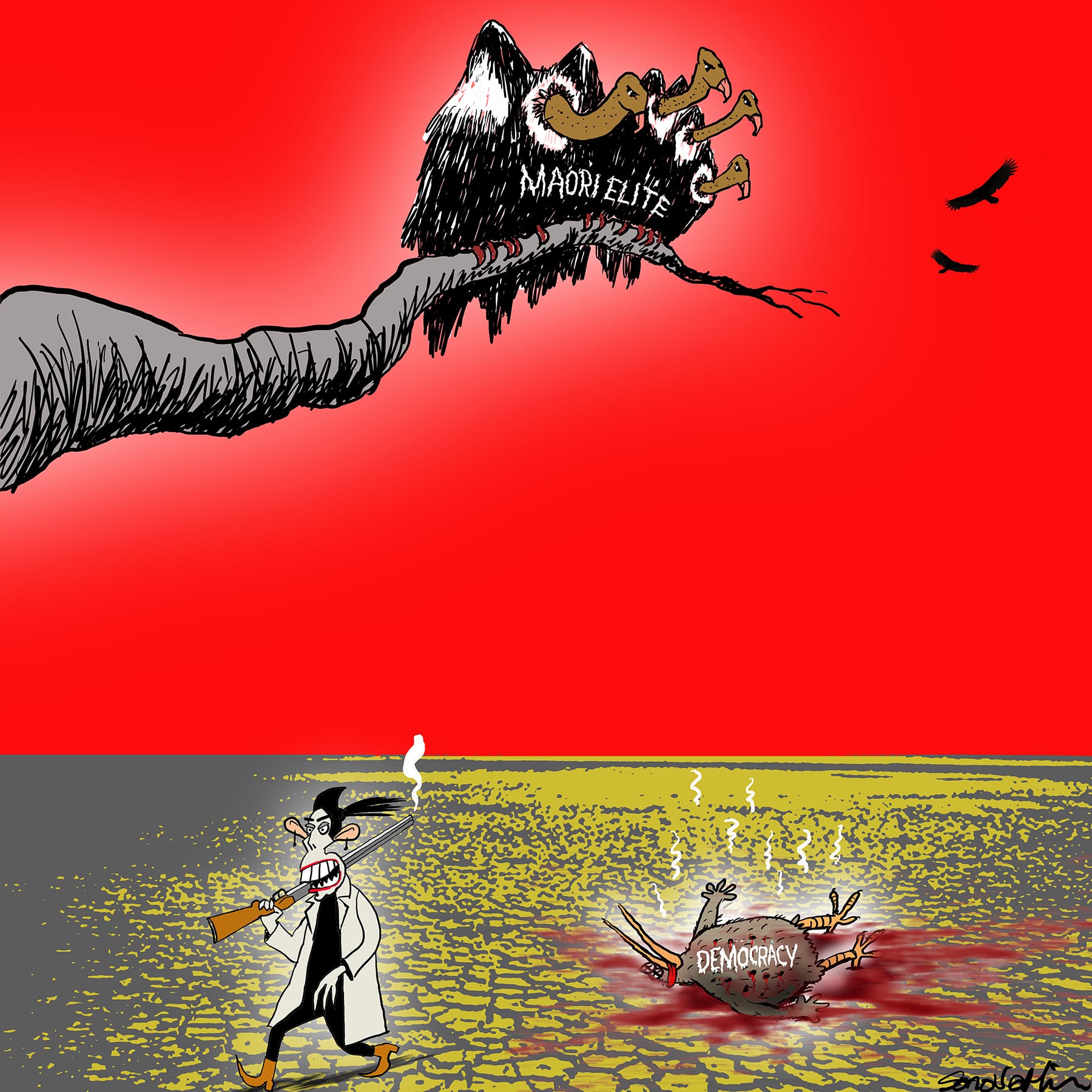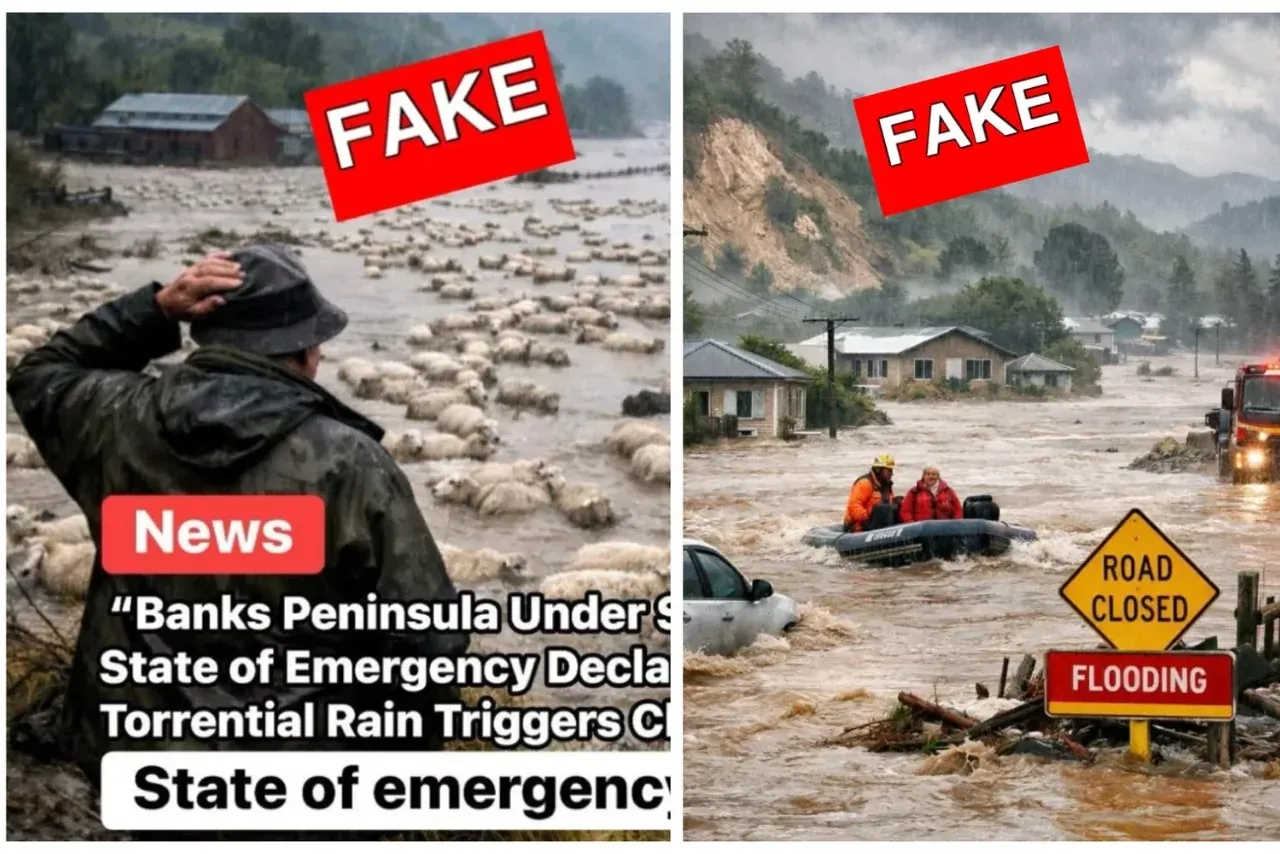Table of Contents
Dr Muriel Newman
nzcpr.com
Dr Muriel Newman established the New Zealand Centre for Political Research as a public policy think tank in 2005 after nine years as a Member of Parliament. A former Chamber of Commerce President, her background is in business and education.
Finally, the mainstream media is reporting that a coup is underway in New Zealand – by the Maori tribal elite.
Admittedly that observation was penned by former Labour Minister and ACT Party leader Richard Prebble in an opinion piece for the Herald – but the newspaper published it and RadioNZ reported it.
The on-line Herald headline read, “Three Waters is a coup — an attack on democracy”.

That bold and compelling headline, however, didn’t last. It was changed to remove the words “a coup” and now reads: “Three Waters is an attack on democracy”.
The obvious question is why?
A clue comes from an article written last year by political journalist Andrea Vance, about Jacinda Ardern’s PR machine: “The Government’s iron grip on the control of information has tightened. At every level, the Government manipulates the flow of information.”
She then explained, “And the prime minister’s office makes sure its audience is captured, starting the week and cementing the agenda with a conference call with political editors.”
So, did a member of the Prime Minister’s Office contact the Herald and ask them to change the headline?
The Prime Minister has recently attempted to discredit her critics as “keyboard warriors”. But she can’t dismiss Richard Prebble that lightly. As a former member of Labour’s Cabinet, he has a unique political insight and his views carry weight.
Richard explains that New Zealand is a “liberal democracy”, and as such, “individual rights and freedoms are officially recognised and protected… by the rule of law.” Governments are therefore “accountable to the people by a system of one person, one vote”.
That means, “Liberal democracy is incompatible with co-government by tribes.”
Richard believes that while there is some logic to the use of co-governance as a pragmatic solution to Treaty claims for the ownership of public assets such as national parks, there is none for Three Waters: “applying it to assets which iwi have no claim to is confiscation… It is ratepayers – Maori and non-Maori – who paid for the pipes, dams, stormwater drains and sewage plants.”
He concludes, “The Government’s Three Waters legislation is a coup. It is replacing liberal democracy with co-government with iwi.”
In fact, it can be argued that Three Waters is much more than co-governance.
The way the Local Government Minister Nanaia Mahuta has structured the legislation – ostensibly to fulfil the fictitious Treaty “partnership” obligations of central government – iwi will gain ultimate control of water services at every level: from the Water Regulator – through the Maori Advisory Board; to Regional Representation Groups – giving iwi a disproportionate 50 per cent control and veto rights; to Water Entity Boards – requiring members with “expertise in accessing matauranga Maori, tikanga Maori and Te Ao Maori knowledge”; to local Te Mana o te Wai directives to Water Entity Boards – that can be issued by any iwi member on any aspect of water services.
Kaipara Mayor Dr Jason Smith, who was a member of Minister Mahuta’s working group described Three Waters as “a Trojan Horse for ending democratic rights”. And, after extensive investigation, journalist Graham Adams has concluded it is a “giant stitch-up” – “a coup hiding in plain sight”.
The Oxford Dictionary defines a coup d’état as “a sudden and great change in the government carried out violently or illegally by the ruling power.”
If ‘violently’ is interpreted as ‘forcefully’, this certainly describes the situation New Zealand now finds itself in.
The iwi elite driving the takeover are seeking tribal rule by 2040. The plan to achieve this goal – He Puapua – was mapped out by the Government in 2019, under the guise of enacting the United Nations Declaration of the Rights of Indigenous Peoples.
Knowing how explosive this agenda was, Jacinda Ardern kept it hidden – so well hidden that even her Deputy Prime Minister Winston Peters knew nothing about it. Nor was it mentioned in Labour’s 2020 Election Manifesto – she only revealed it after winning the election.
But as the 1986 Royal Commission into New Zealand’s Electoral System warned, “Our Governments have great powers and great responsibilities. Their exercise of those powers and fulfilment of those responsibilities is legitimate only because it arises from the consent of the people.”
By failing to gain the consent of voters for her plan for tribal rule, Jacinda Ardern has no mandate for her He Puapua co-governance agenda – it is illegitimate.
The Government’s Office for Maori Crown Relations clarifies on their website where this tribal ‘partnership’ agenda is leading: “Maori decide and the Crown assists in implementing the decision made by Maori. The Crown’s role is as enabler and implementer not decision-maker.”
Hiding in plain sight, this Government website confirms that the ultimate goal of this so-called ‘co-governance’ partnership agenda is tribal rule.
To understand the mechanisms being used, we need to look back to 2019 when Jacinda Ardern boasted to the Bill Gates Foundation about how she was implementing the radical objectives of the United Nations: “My Government is doing something not many other countries have tried. We have incorporated the principles of the 2030 Agenda into our domestic policy-making in a way that we hope will drive system-level actions… It is about fundamentally changing how we make decisions and allocate resources…”
In another address that same year to the World Economic Forum, she explained her reforms were designed to lead to permanent change: “One of the biggest threats we have … are political cycles. This needs to be something that we embed in our national cycles, in our political cycles, and in our actions and it needs to endure beyond us as individuals.”
Using this same approach, the Prime Minister is embedding tribal rule into our regulatory and legislative framework. Enabling iwi to control health required new legislation to abolish the country’s 20 health boards; and giving them control of water involves a bill to confiscate water infrastructure and services from all 67 councils.
When it came to the Public Service, new legislation was also needed with the PM’s tribal rule provisions included in the Public Service Legislation Bill that was passed into law just before the 2020 election – again, hiding in plain sight.
The Public Service Commission’s Factsheet 3 outlines the requirements. Under the new Act, The Public Service Commissioner and Chief Executives are accountable to their Minister for “strengthening the Crown’s relationship with Maori”. This means not only ensuring staff ‘engage’ appropriately with Maori, but also that a Maori World View dominates the way they operate – including using the Maori language, adopting Maori customs, and applying the Treaty “day-to-day”.
And when it comes to employment decisions, they are required to “recognise the need for greater involvement of Maori in the Public Service”.
Back in 2018, when the Office for Maori Crown Relations was being established, iwi leaders demanded status in official Government decision-making. Through the appointment of specialist iwi advisors in key state sector agencies, their influence is now widespread. As a result, Maori supremacists are not only changing the culture of the public service and other government agencies, but of the country itself.
The 2021 Annual Report of the Office for Maori Crown Relations confirms the mission of their 180 staff “is all about embedding the Treaty into policy and lifting capability across the Crown… In practical terms, we get involved across the full range of the government’s reform agenda. We help agencies consider the Treaty in policy design and implementation… Maori rights and interests are built into the design.”
Among the many ‘training’ resources available on their website, one explains their goal is “a significant culture change across the public service.” Another suggests hiring more Maori, paying them more, and providing “paid leave to fulfil iwi responsibilities.” Yet another requires staff to “demonstrate a commitment to tikanga Maori, speak te reo, and participate in kapa hake groups.” An overarching requirement is indoctrination in ‘institutional racism’ and the ‘impact of colonisation’.
To assess the competency of public sector agencies in supporting “the Maori-Crown relationship” a survey has been devised which questions staff over such things as whether “I feel confident in my ability to: introduce myself in te reo; converse in te reo; pronounce te reo words correctly; or sing two waiata from memory.”
It asks whether they would be confident to “work in partnership and share decision-making with a Maori group”, and it also seeks their feedback on whether their agency “may inadvertently disadvantage Maori.”
By encouraging public service staff to provide feedback on the progress of their agencies in adopting the Prime Minister’s tribal rule agenda, implementing a Maori World View is now dominating the government sector.
With increasing pressure on the Public Services Commissioner and Chief Executives to deliver on the objectives of the iwi elite, is it any wonder that real service delivery and performance is in decline? Has it all gone so far, that policy development has now reached the point where, for instance, the Government’s inadequate response to the country’s critical workforce shortage is, in fact, being influenced by the opposition of iwi leaders to immigration?
Tribal control is now replacing our Kiwi culture within the heart of Government by ensuring Maori rights and interests dominate the agenda. And it doesn’t just stop with the core public service either. In the best totalitarian tradition, everyone in ‘official’ positions is being targeted including teachers, school trustees, doctors, nurses, firefighters, Police, military, and local authority employees.
The scale and speed of this cultural takeover is breath-taking, and its effect is the reshaping of democracy as we know it.
This week’s NZCPR Guest Commentator is Professor Elizabeth Rata, the Director of Knowledge in Education at Auckland University, who outlined the threat posed by this tribal coup in a recent address entitled “In Defence of Democracy”:
“I want to talk about democracy – about what it is we are in danger of losing and what we need to do to retain our nation’s remarkable 170 year legacy of democratic governance…
“The question we must ask is this: How has a small group of individuals, both Maori and non-Maori, managed to install a racialised ideology into our democracy?
“The corporate tribes have already acquired considerable governance entitlements – the next and final step is tribal sovereignty. It’s a coup d’etat in all but name, accomplished not by force but by ideology – enabled by a compliant media.
“Given the enormous success of retribalism is it too late to reclaim New Zealand from the relentless march to blood and soil ethno-nationalism?
“That depends upon our willingness to understand, value, and restore democracy.”
Professor Rata paints a bleak picture of the future – unless New Zealanders wake up and fight back.
The reality is that because ordinary Kiwis are allowing it to happen, as a country, we are sleepwalking our way to apartheid – in our case the tyranny of a minority over a majority.
But, just as Jacinda Ardern embedded her racist tribal rule agenda throughout our statutory framework, so too it can all be repealed.
As Professor Rata has recommended, removing all references to the Treaty and its principles from legislation and public institutions – including universities – is the key.
We also need to do more to remind New Zealanders that the principles of democracy should not be tampered with nor altered to suit the selfish power-hungry motives of an aggressive minority.
Fortunately, people like Richard Prebble, Jason Smith, Graham Adams, and Elizabeth Rata are calling out the transformational change Jacinda Ardern promised for what it is – a coup against democracy.
Generations before us have fought and died for the democracy New Zealand had, before she became our Prime Minister.
We owe it to them, and to our future generations, to take a stand and defend our democracy against this attack.
Our collective goal must be to save New Zealand – and our democratic Kiwi way of life – and in this mission, we cannot allow ourselves to fail!









